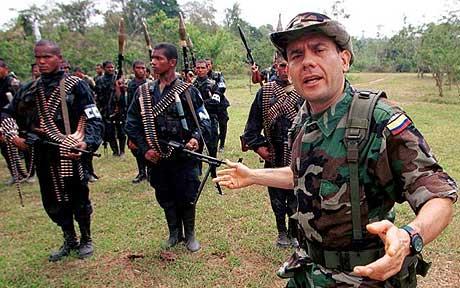 Carlos Castano in 2001. He is killed in 2004 under mysterious circumstances.
Carlos Castano in 2001. He is killed in 2004 under mysterious circumstances.
 Carlos Castano in 2001. He is killed in 2004 under mysterious circumstances.
Carlos Castano in 2001. He is killed in 2004 under mysterious circumstances.
Counter-Counter-Narcotics and the Paramilitaries
The Colombia Plan is officially justified in terms of the "drug war," a claim taken seriously by few competent analysts. The US Drug Enforcement Administration (DEA) reports that "all branches of government" in Colombia are involved in "drug-related corruption." In November 1998, US Customs and DEA inspectors found 415 kg of cocaine and 6 kg of heroin in a Colombian Air Force plane that had landed in Florida, leading to the arrest of several Air Force officers and enlisted personnel. Other observers too have reported the heavy involvement of the military in narcotrafficking, and the US military has also been drawn in. The wife of Colonel James Hiett pleaded guilty to conspiracy to smuggle heroin from Colombia to New York, and shortly after, it was reported that Colonel Hiett himself, who is in charge of US troops that trained Colombian security forces in "counternarcotics operations," was "expected to plead guilty" to charges of complicity. The paramilitaries openly proclaim their reliance on the drug business. "The leader of the paramilitaries [Carlos Castano] acknowledged in a television interview that the drug trade provided 70 percent of the group's funding," correspondent John Donnelly reported in March 2000. This was the first appearance on Colombian TV of Castano, who heads the largest and most brutal of the paramilitary organizations. He claimed to command a force of 11,200 men "financed by extortion and income from 30,000 hectares of coca fields in Norte de Santander." But "the US-financed attack stays clear of the areas controlled by paramilitary forces," Donnelly observes, as have many others. The targets of the Colombia Plan are guerrilla forces based on the peasantry and calling for internal social change, which would interfere with integration of Colombia into the global system on the terms that the US demands: dominated by elites linked to US power interests that are accorded privileged access to Colombia's valuable resources, including oil—quite possibly a significant factor behind the Colombia Plan.